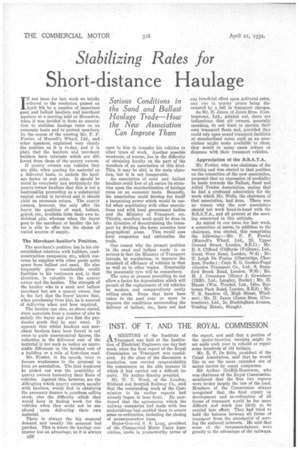INST. OF T. AND THE ROYAL COMMISSION
Page 48

If you've noticed an error in this article please click here to report it so we can fix it.
AMEETING of the Institute of Transport was held at the Institution of Electrical Engineers one day last week, when the final report of the Royal Commission on Transport was considered. At the close of the discussion a resolution was carried congratulating the commission on the able manner in which it had carried otit a 'difficult inquiry. Sir Arthur Stanley presided.
Mr. W. V. Wood, of the London, Midland and Scottish Railway Co., said that the outstanding work of the Corn'mission in its earlier reports had already begun to bear fruit. He mentioned that the agreements which the railway companies had made with bus undertakings had enabled them. to secure some co-ordination, including the closing of unremunerative lines.
Major-General S. S. Long. president of the Commercial Motor Users Association, spoke in praiseworthy terms of the report, and said that a portion of the motor-taxation receipts might be set aside each year to rebuild or repair some hundreds of old bridges.
Mr. R. F. De Sails, president of the Canal Association, said that be would like to see the more extended use of motor lorries by canal companies.
Sir Arthur • Griffith-Boscawen, who was chairman of the Royal Commission, mentioned that the first two reports were to-day largely the law of the land. Members of the Commission always recognized that the final report on development and co-ordination of all farms of transport would be far more difficult and much less likely to be carried into effect. They had tried to hold the balance between all forms of transport from the standpoint of serving the national interests. He said that some of the recommendations were greatly to the advantage of the railways.












































































































